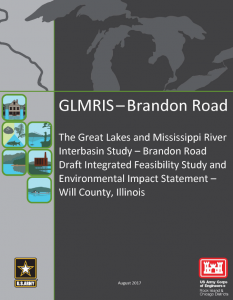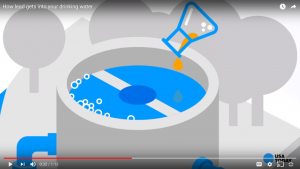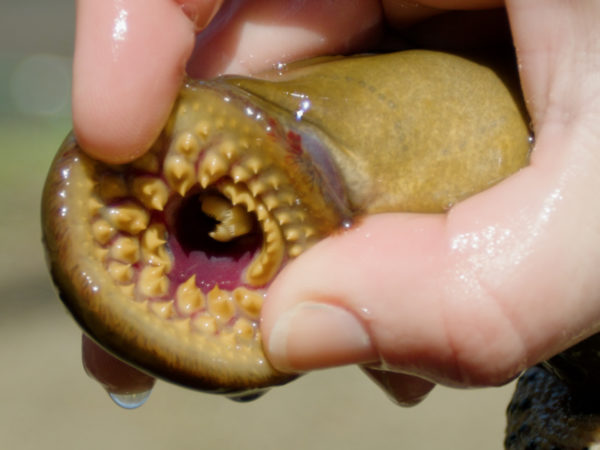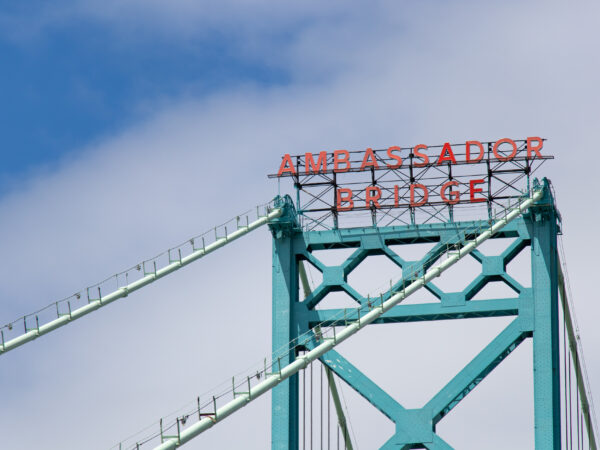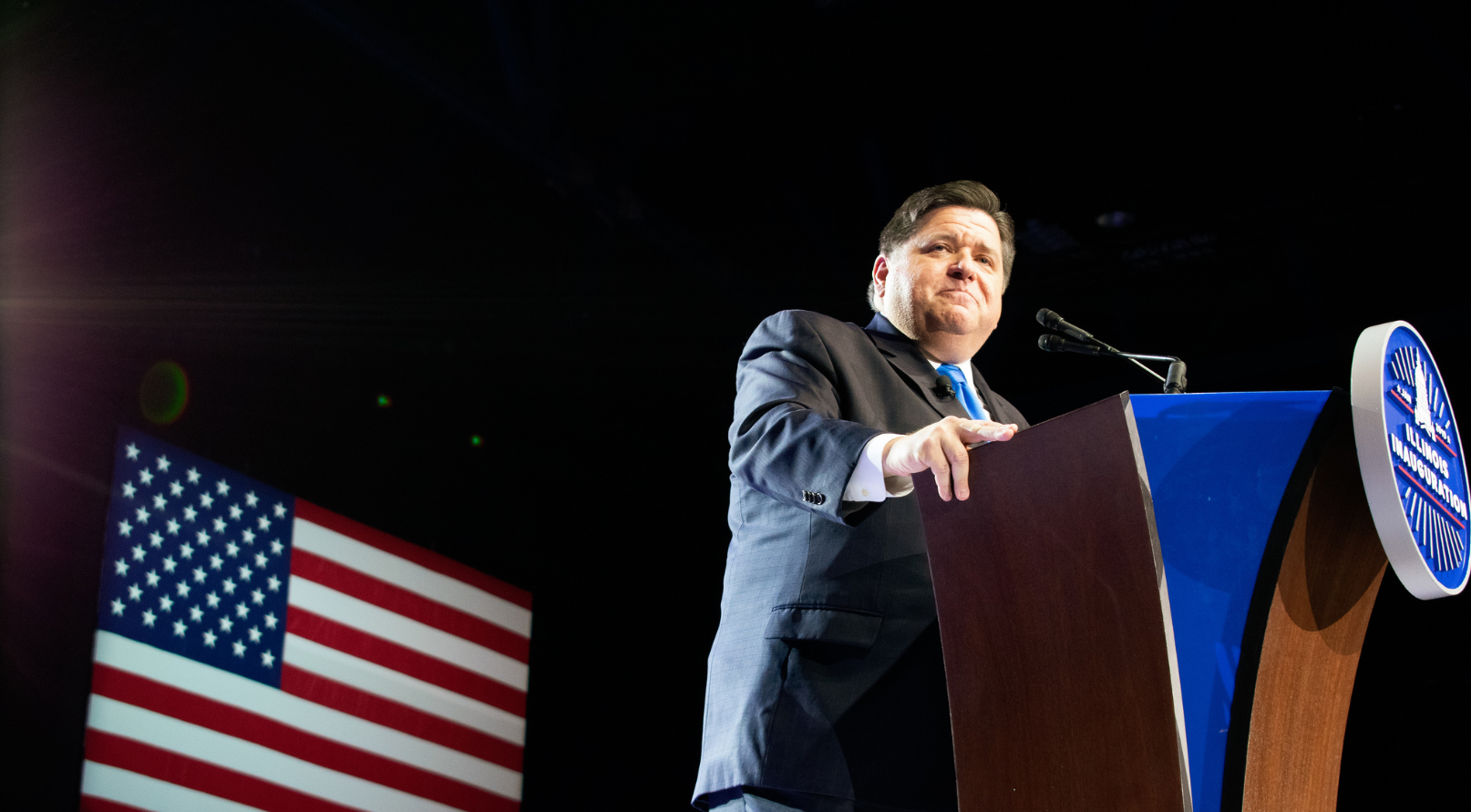
Opportunity to shed outlier status on Asian carp, other Great Lakes issues
It’s an open secret in the Great Lakes region: When it comes to protecting the Great Lakes, Illinois is considered an outlier compared to Michigan and other Great Lakes states. But now, with a new governor leading, will Illinois fall into step more closely with other states and the Canadian provinces in the basin, at least on some issues?
Invasive Asian carp and water diversions are two issues frequently cited as examples of Illinois’ intransigence in recent years.
Since the Asian carp issue hit the spotlight in 2009, Illinois, under both Democratic and Republican governors, has successfully stonewalled the region on a permanent infrastructure fix to stop the carp and other aquatic invaders from inland waterways in Illinois that connect to Lake Michigan and the rest of the system.
Illinois has relied on an aggressive Asian carp harvesting for food program generically titled – If You Can’t Beat’em, Eat’em – that while successful in the short term, is not seen credible as a long-term solution. An estimated 850,000 pounds of Asian carp are removed annually from the Illinois waterways according to the Asian Carp Regional Coordinating Committee.
And on the issue of water withdrawals, while it took Waukesha, Wis. a decade or more to secure permission from other Great Lakes states to divert a few million gallons of Lake Michigan water per day, Illinois continues to take up to 2 billion gallons daily based on a 1967 Supreme Court decision.
Toss in a state agency that until recently treated the Chicago River as an open sewer, and you can start to understand the feeling some have that Illinois doesn’t place the same value on water quality and conservation as other Great Lakes states.
New governor has opportunities
Last week billionaire Democrat J.B. Pritzker was sworn in as governor of Illinois, and he inherits the state’s Great Lakes legacy.
Environmental issues were non-issues in the election campaign and Pritzker has said little about them since.
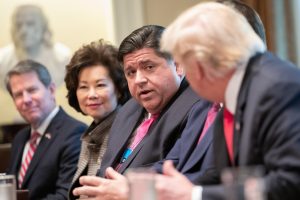
Governor-elect J.B. Pritzker meets with President Trump in the Cabinet Room of the White House, Photo by Shealah Craighead, Official White House via flickr.com
In a post-election visit to the White House with other incoming governors including Michigan Gov. Gretchen Whitmer, Pritzker mentioned the need for federal help on Asian carp to President Trump.
The U.S. Army Corp of Engineers has a plan pending for infrastructure changes that would go a long toward stopping the carp advance in the Chicago waterways. It requires Congressional approval and funding.
It will also require Illinois’ approval that would put Pritzker at odds with barge operators who oppose infrastructure changes they say could hamper shipping and lead to a negative economic impact.
Pritzker “has the opportunity to return Illinois to leading rather than lagging in protecting the lakes from Asian carp,” Alliance for the Great Lakes top executive Joel Brammeier wrote in a post-election briefing on his website.
In his inaugural speech Pritzker talked about the need to “embrace a broad vision of environmental protection” but offered no specifics. He said he believes in science and pledged that Illinois will join the U.S. Climate Alliance that supports the Paris Climate Accord.
Priorities
Beyond Asian carp and climate action, the Natural Resources Defense Council’s (NRDC) Chicago office has a priority list for Pritzker’s focus and drinking water quality is on the list.
There’s a “need to revisit and strengthen the state’s bill on lead contamination and look very closely at what Michigan is doing to get lead drinking water lines out of the ground,” says Josh Mogerman, NRDC’s national media director.
NRDC recently praised the work of former Michigan Gov. Rick Snyder for “tackling the source of the problem head-on” by focusing on infrastructure.
Mogerman said that Pritzker’s environmental protection and natural resource agencies should pay more attention to environmental justice issues.
Those agencies should look “more closely at cumulative impacts on environmental justice and low-income communities in their permitting and land-use decisions,” Mogerman said. “Both agencies need re-investment so they can be appropriately resourced to monitor and enforce essential public health and environmental protections.”
Chicago’s heavily industrialized Southeast Side communities have ongoing struggles with air quality based on petcoke and manganese emissions from nearby plants.
Collaborative opportunities
As a Great Lakes state governor, Pritzker will have an opportunity to engage with his regional colleagues on environmental issues via two organizations – the Great Lakes Commission and Great Lakes and St. Lawrence Governors and Premiers. Wisconsin Gov. Tony Evers will serve as chair, and Ohio Gov. Mike DeWine will be vice chair of the latter group, according to reports this week.
There’s also the regional group the Great Lakes and St. Lawrence Cities Initiative representing U.S. and Canadian mayors with its headquarters in Chicago. The mayors have been at odds with the governors over water diversions so Pritzker may have an opportunity to mend fences there.
Politically, Pritzker has potential allies on Great Lakes issues with newly-elected Democratic governors in Michigan and Wisconsin who replace two-term Republicans.
Pritzker’s first task may be to reconcile Illinois’ position on Asian carp with regional colleagues which may require him to take a position at odds with the Illinois waterways shippers.
Neither Pritzker’s office nor the Illinois Department of Natural Resources responded to Great Lakes Now’s requests to comment on the Asian carp issue.
Featured Image: Governor J.B. Pritzker addresses members of the audience, Photo by Vishesh Anand, Illinois Public Media via flickr.com cc 2.0


